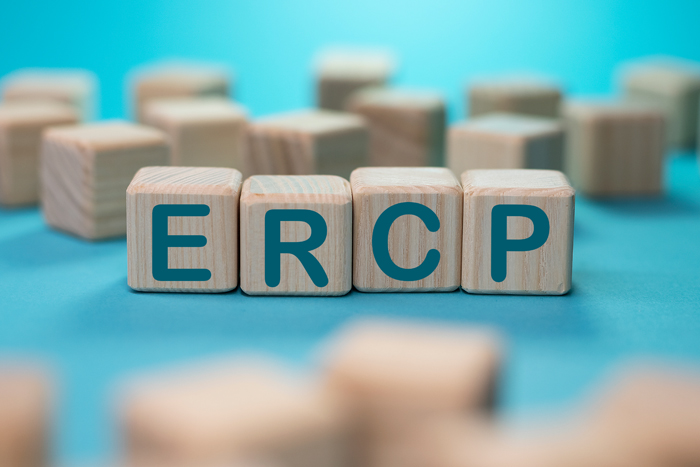ERCP Treatment & Diagnostics in Chirag Enclave, Delhi
ERCP
Overview of ERCP -
The digestion procedure in the human body is complex. Our body has dedicated organs that facilitate the digestion process. Due to the continued functioning of our digestion system, it becomes crucial to provide the best treatment to these organs. Some advanced techniques like Endoscopic Retrograde Cholangiopancreatography or ERCP use the best technology for detecting body issues. Thus, the endoscopy doctors in New Delhi offer the best treatment for bile and pancreatic issues to promote smooth digestion.
About ERCP -
Bile ducts are small tubes that carry bile juice from the liver to the gallbladder and duodenum. Similarly, the pancreatic ducts are small tubes that carry pancreatic juices from the pancreas to the duodenum. These two, i.e., the common bile duct and the main pancreatic duct join before emptying their contents in the duodenum. Endoscopic Retrograde Cholangiopancreatography or ERCP combines the benefits of x-rays and endoscopy to check the condition of bile and pancreatic ducts. The endoscopy treatment in New Delhi can help you get the best, precise, and most affordable diagnosis of your medical condition.

Who Qualifies for ERCP?
Endoscopic Retrograde Cholangiopancreatography or ERCP is a medical technique that combines the use of fluoroscopy and endoscopy. You may qualify for ERCP if you bile or pancreatic ducts are either too narrow or completely blocked. Such a condition might arise due to any of the following health issues -
- Gallstones in your gallbladder that are blocking your bile duct
- pancreatic pseudocysts
- acute or chronic pancreatitis
- surgical complications or trauma in your bile or pancreatic ducts
- infection
- tumors or cancers of the bile ducts or the pancreas
Your pancreatic and bile ducts may need to go for Endoscopic Retrograde Cholangiopancreatography or ERCP if, you’ve:
- Yellow skin, eyes, etc., indicating jaundice
- Light stools or dark urine
- & Lesion or tumors
- Stones in pancreas duct or bile duct
Why is ERCP conducted?
Endoscopic Retrograde Cholangiopancreatography or ERCP can be done for diagnostic or therapeutic uses. ERCP becomes necessary in medical conditions like obstructive jaundice that require immediate attention. The causes of this type of jaundice can be an injury to bile ducts, dilated bile ducts, gallstones, suspended bile duct tumors, etc. Conditions like chronic pancreatitis or pancreatic rumors call for ERCP. The therapeutic causes of ERCP include insertion of stents, removal of stones, debris, after treatment of liver transplants, etc.
It is highly recommended to go to a registered medical practitioner if you’re facing any issues or symptoms with pancreatic or bile ducts. The endoscopy doctors in New Delhi can help you with the best medication and effective treatment of different liver, pancreatic, and gall bladder conditions.
Different Types of ERCP -
The types of Endoscopic Retrograde Cholangiopancreatography or ERCP depend on the purpose sorted from the process. The different types of ERCP that can be performed include:
- Pancreatic tumors that cause jaundice and bile duct obstructions.
- Chronic pancreatitis
- Obstructive jaundice
- Endoscopic sphincterotomy or the sphincter of Oddi
- Extraction of biliary debris or stones
- Strictures dilation
- Insertion of stent
Benefits of ERCP -
Many doctors prescribe ERCP for different diagnostic and therapeutic uses. The endoscopy treatment in New Delhi offers the best out of this procedure. This may require you to stay in hospital for a day or two, depending on your condition.
ERCP is a medical process that is used to check the condition of bile and liver ducts. It is an advanced procedure that needs to be performed under the strict supervision of gastroenterologists only.
Request an appointment at Apollo Spectra Hospitals, Chirag Enclave, Delhi.
Call 1860 500 2244 to book an appointment.
Risk factors in ERCP -
The main risk factors in Endoscopic Retrograde Cholangiopancreatography or ERCP include:
- Post-ERCP pancreatitis
- Contrast manipulation
- Intestinal perforation
- Internal bleeding
- Hospital-acquired infections
- Tissue damages
Complications in ERCP -
The complications in ERCP are rare but may include:
- Fever and chills
- Vomiting
- Acute belly pains
- Blood in stool
References -
Your doctor will inject sedatives and, in some cases, may keep you in anesthesia during ERCP.
You may have to wait for 24-36 hours before leaving the hospital.
ERCP is a medical procedure that should be performed under the strict supervision of medical practitioners only.
Symptoms
Our Top Specialities
NOTICE BOARD
CONTACT US
CONTACT US
 Book Appointment
Book Appointment


.svg)
.svg)
.svg)
.svg)








